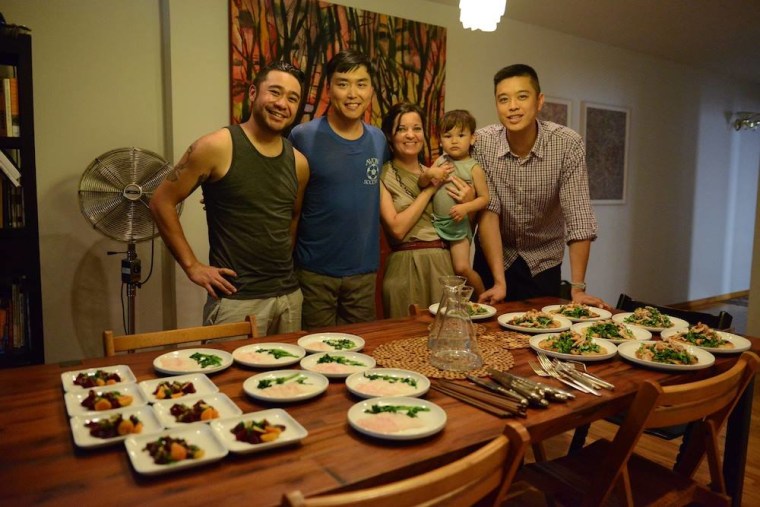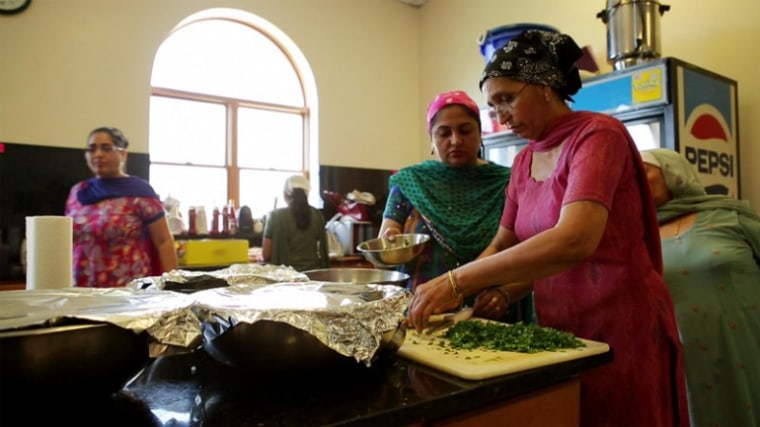Walk through lower Manhattan's Orchard Street in New York City, through a collection of city blocks that combine small Chinese bakeries with quaint new cafes, and among the mix stands Fung Tu, with glass doors that look in on the sleek tables and rustic décor reminiscent of New American gastropubs next door on the Lower East Side.
Nestled in its little spot, the restaurant provides a gateway to more modern times, perhaps giving a glimpse into the future of New York Chinatown’s many little eating parlors.
This evolution of culture defines director Grace Lee’s “Off the Menu: Asian America," which premieres nationally on PBS on Dec. 8, tells the stories of Asian-American communities through food, including cuisines whose traditions are still relatively unknown to many. In a cross-country journey from Texas to Hawaii, Lee examines the ever-changing nature of food and the evolving stories that illustrate Asian-American identity.
With so many communities and experiences at stake, the question of how to represent all of "Asian America" led Lee to reflect on authenticity. But the concept of authenticity can also lead to a divisive question: how is someone or something “Asian enough,” yet “American enough” to be part of the Asian American community?
"Raising these questions was important because it asks people, what do these labels mean?” Lee told NBC News. “An ‘authenticity of spirit’ matters here because it talks about the experiences of Asian Americans and how their own personal interactions with their culture shapes [identity].”
This “authenticity of spirit” launched the creation of Fung Tu in Manhattan's Chinatown by Jonathan Wu and Wilson Tang, who are featured in "Off the Menu." Fung Tu relies not on the popular fusion dishes springing up in many locations around the U.S., but extends way back to the Wu's and Tang's own childhood and their own personal experiences with Asian cuisine.

“The way that I delved into [designing the dishes] was to talk to my mom and ask her about the food, to the dishes that she made,“ Wu told NBC News. “It was remembering the dishes that my mom made and trying to reverse engineer them in a way, and also interpret them in my own style.”
"Food is what we all have in common, and it brings people together and gives people purpose."
But these same stories also call on memories and traditions, many of which were from way before the current generation’s birth. “I was talking to a older relative who grew up in Shanghai pre-Cultural Revolution and I asked him about the foods of their childhood. [He] described black, smoked dates stuffed with red bean paste, coated in egg whites and fried,” Wu said. “So there’s a familiar narrative, there’s also a cultural context [that] speaks to the Cultural Revolution. There’s this very traumatic event, the eradication of culture and it was across the board, whether in the arts or the culinary, that huge migration of cooking talent to Taiwan.”
Lee also highlights the story of how food brought about hope and healing for a Sikh community in Oak Creek, Wisconsin. Lee's trip to Oak Creek for “Off The Menu” revisits the site of a deadly 2012 shooting at a Sikh gurdwara where six people lost their lives when a gunman attacked the temple as the community was preparing langar, a traditional Sikh communal meal prepared for the enjoyment of everyone at the temple regardless of their background.
While langar had always served as a means to unify and bring together everyone at the gurdwara, the meal had a different meaning for Oak Creek’s Sikh community after the mass shooting.
“After [the shooting], the gurdwara was locked and they weren’t letting people inside,” recalled Kamwar Deep Kaleka, a member of the gurudwara and one of Lee's interviewees. “But the morning that they did, everyone rushed in and started cooking at only 7AM. By nine, our langar was ready and we were all there to eat.”
RELATED: Langar Tradition Expresses Key Sikh Principles
Langar, as Lee and her film crew found, is one of the strongest demonstrations of food’s role in building a cultural identity. Or, as Deep Kaleka notes, the spirit of an entire cultural community.
“Eating langar is a blessed part, and it’s through food that you live for faith, that you live for God, and that you realize each person is God. There’s a reason why the kitchen is always a central location of the house, and that’s because food makes us equal. Food is what we all have in common, and it brings people together and gives people purpose," Deep Kaleka said.
That spirit of purpose is also told through the story of Glen Gondo's Tex-Mex take on sushi rolls in Texas, or the dedication of a younger generation to the restoration of Hawaii's organic farms and traditional fish ponds.
Lee said the diverse stories told through “Off The Menu” shows that the real definition of “Asian America” is one that is forever changing.
“There’s a lot of fluidity and a kind of mobility about being Asian American that if you sort of lay down the law and stop changing, you’re getting yourself into trouble,” Lee said. “I think that to be Asian American, you need to have that fluidity that lets you change.”
